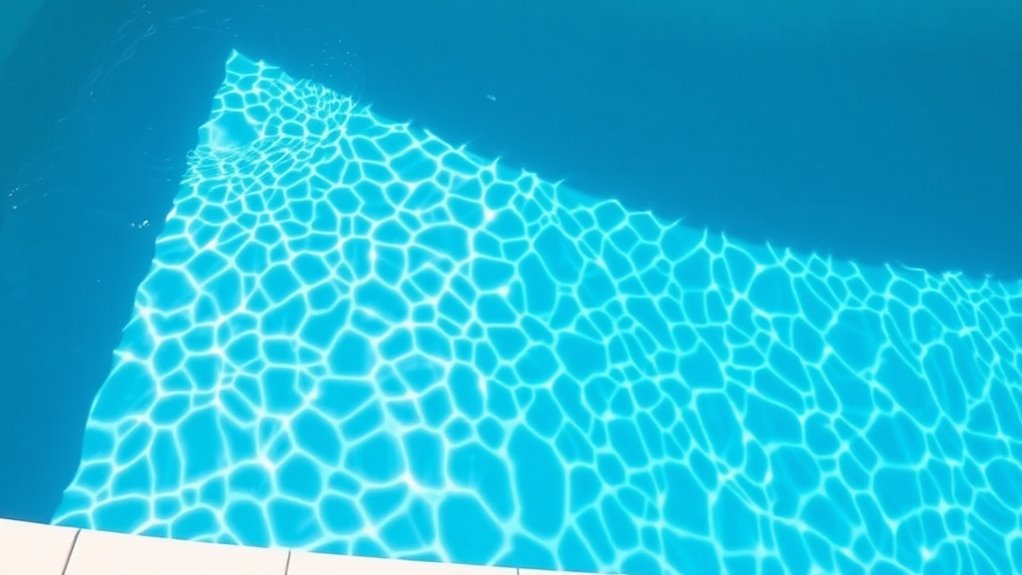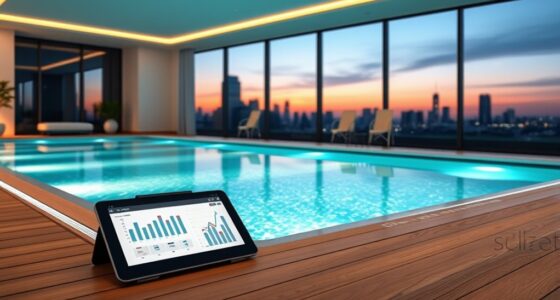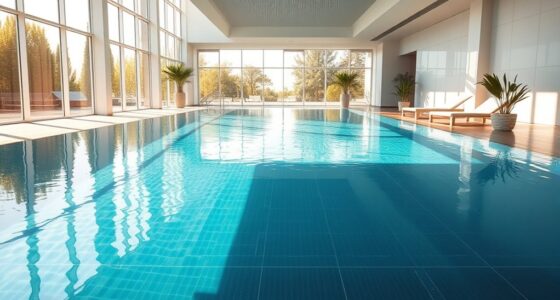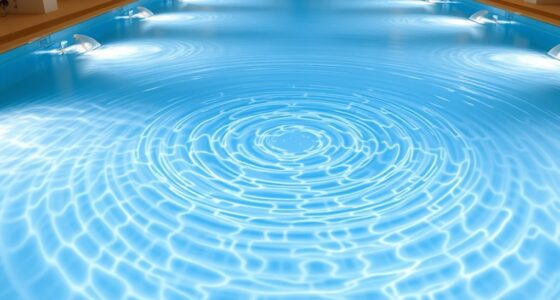Choosing between a saltwater or chlorine system for your endless pool depends on your priorities. Saltwater pools require higher initial costs and regular salt and pH checks, but they offer softer water and less irritation. Chlorine pools lower upfront expenses but need more frequent chemical adjustments and can cause dryness. If you want a more comfortable, eco-friendly experience, saltwater might be better; to find out more, explore the details below.
Key Takeaways
- Saltwater pools generate chlorine automatically, reducing manual chemical adjustments and providing softer, more comfortable water.
- Chlorine pools have lower initial setup costs but require frequent chemical purchases and maintenance.
- Saltwater systems offer a more eco-friendly, sustainable option with fewer hazardous byproducts.
- Proper maintenance is essential for both systems; saltwater pools need salt level monitoring and cell cleaning.
- Consider your budget, maintenance preferences, and environmental impact to determine the best choice for your Endless Pool.
Understanding the Basic Differences Between Saltwater and Chlorine Systems
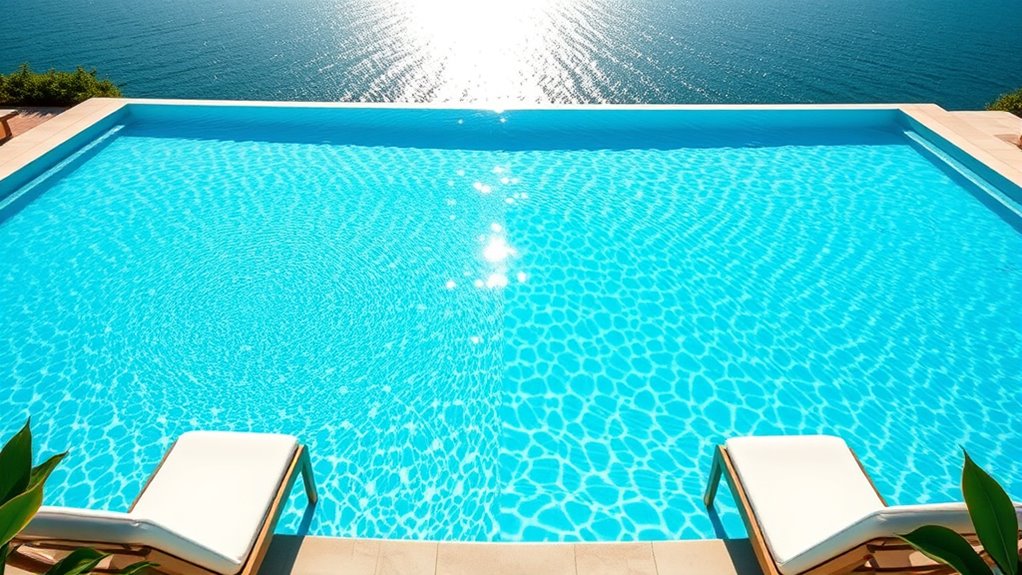
While both saltwater and chlorine pools serve the same purpose of keeping your pool clean and sanitized, they operate quite differently. In a chlorine pool, you add chemical tablets or liquid chlorine directly to the water, maintaining a steady level of free chlorine. Saltwater pools, on the other hand, generate chlorine automatically through a salt-chlorine generator that converts salt into chlorine as water passes through it. This process produces a steady supply of chlorinating agents without needing to manually add chemicals. Saltwater pools typically start with a salt level similar to seawater, making the water feel softer and less harsh on your skin and eyes. Overall, the main difference lies in how chlorine is introduced and maintained within the pool environment. Additionally, the chlorine generation process in saltwater pools can result in more consistent chemical levels, reducing the likelihood of fluctuations that may occur in traditional chlorine pools.
Maintenance and Chemical Management for Each System
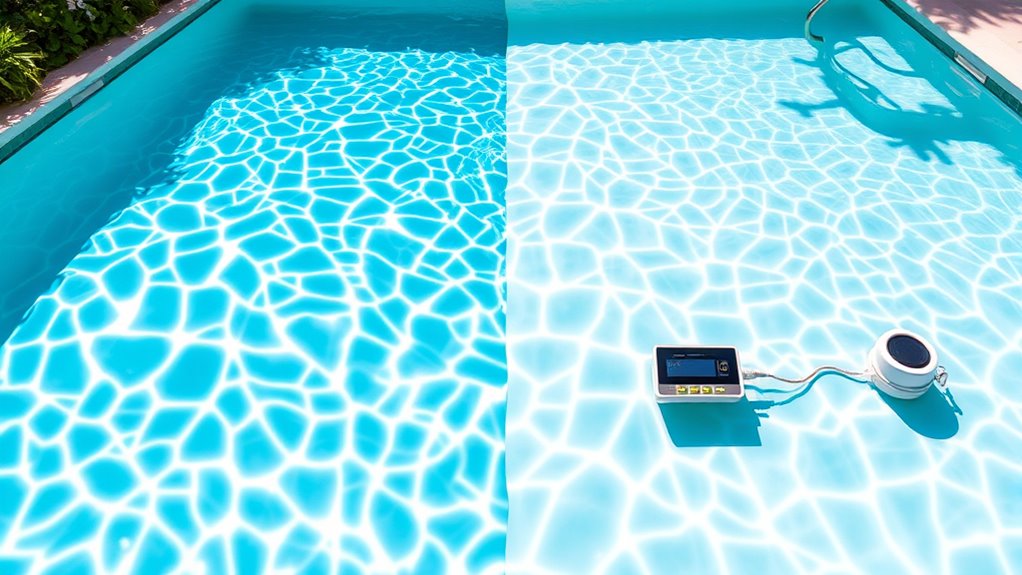
Maintaining a saltwater or chlorine pool requires different approaches to chemical management, but both demand regular attention to keep the water balanced and safe. With a saltwater pool, you’ll mainly monitor salt levels, pH, alkalinity, and stabilizer levels, adding salt as needed and adjusting chemicals to maintain proper balance. You’ll also need to check the cell’s chlorine production and clean it periodically. For chlorine pools, you’ll manually test and add chlorine, pH adjusters, and stabilizers more frequently. Regular testing ensures proper sanitizer levels and prevents algae growth or cloudy water. Both systems require consistent monitoring of water chemistry, but saltwater pools tend to need less frequent chemical adjustments over time. Staying on top of these tasks helps extend equipment life and keeps your pool water safe and enjoyable. Incorporating Glycolic Acid in pool maintenance routines can also support skin health and help manage residue buildup on pool surfaces.
Cost Analysis: Initial Investment and Ongoing Expenses
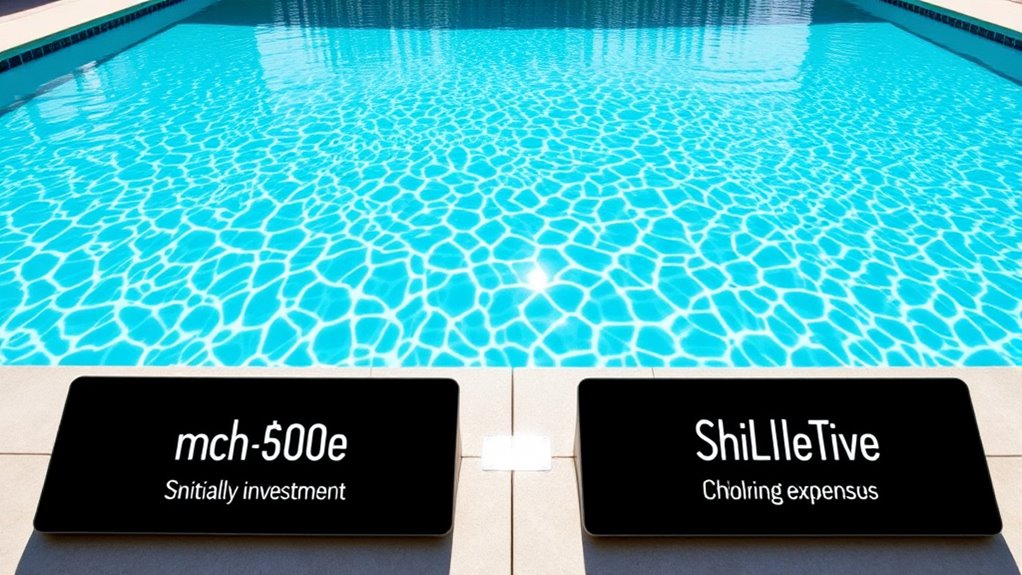
When comparing the costs of saltwater and chlorine pools, the initial investment usually leans higher for saltwater systems due to the price of the saltwater generator and related equipment. You’ll likely pay more upfront for installation and setup. Chlorine pools, on the other hand, generally have lower initial costs because chlorine chemicals are inexpensive and easy to add. However, saltwater systems tend to have higher ongoing expenses because of electricity use for the generator and periodic replacement parts. Chlorine pools require regular chemical purchases, but these costs are usually predictable and lower. Over time, your total expenses will depend on pool size, usage frequency, and maintenance needs. Additionally, understanding the long-term maintenance requirements can help you make a more informed decision. Weighing these costs helps you decide which system aligns better with your budget and long-term financial plans.
Environmental Impact and Sustainability Considerations
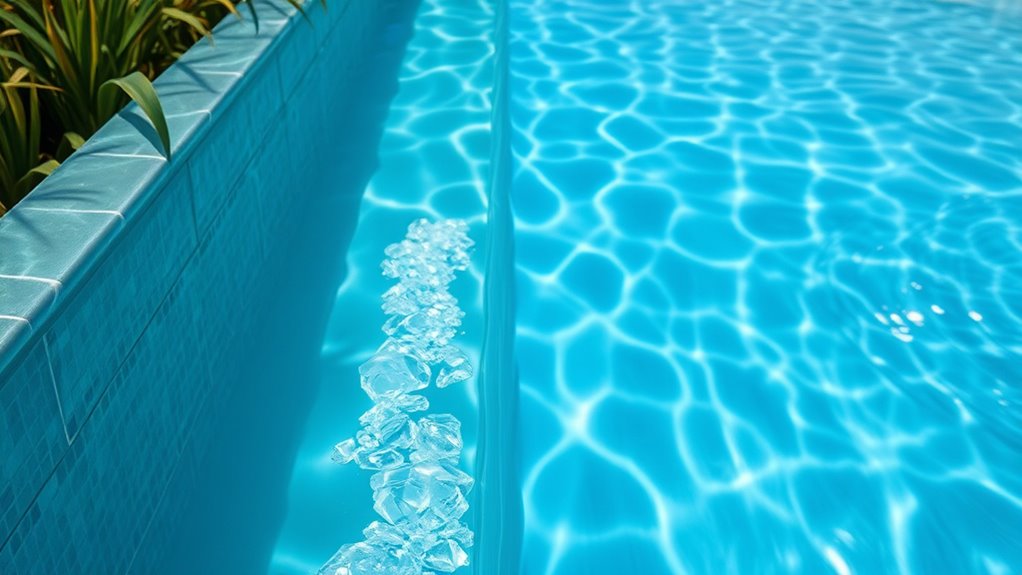
Saltwater pools often have a lower environmental impact than traditional chlorine pools because they generate disinfectant on-site, reducing the need for transporting and storing chemical supplies. This minimizes carbon emissions and chemical spills. Salt systems also produce fewer harmful byproducts, making them safer for the environment. In contrast, chlorine pools rely on manufacturing, packaging, and transportation, increasing their ecological footprint. Here’s a quick comparison:
| Aspect | Saltwater Pool | Chlorine Pool |
|---|---|---|
| Chemical Production | On-site salt conversion | Factory-produced chlorine |
| Transportation Impact | Minimal | Significant |
| Waste & Byproducts | Fewer hazardous residues | More chemical waste |
Choosing a saltwater system supports sustainability by reducing chemical use and lowering your pool’s overall environmental footprint.
User Comfort and Water Quality Experience

The choice between saltwater and chlorine pools substantially affects your overall swimming experience, particularly regarding comfort and water quality. With saltwater pools, you’ll notice softer, gentler water that feels less harsh on your skin and eyes. The salt content creates a more natural feel, reducing irritation often caused by traditional chlorine. Chlorine pools, on the other hand, can sometimes cause dryness, redness, or stinging, especially if levels aren’t well-maintained. Water clarity is usually excellent in both types, but saltwater pools tend to have fewer chemical odors and less residual chemical taste. Overall, saltwater pools often offer a more pleasant, less irritating experience, making your swim more comfortable. Proper maintenance, including monitoring water quality and ensuring appropriate salt levels, is key to ensuring water remains clean, balanced, and enjoyable.
Making the Right Choice for Your Lifestyle and Pool Use
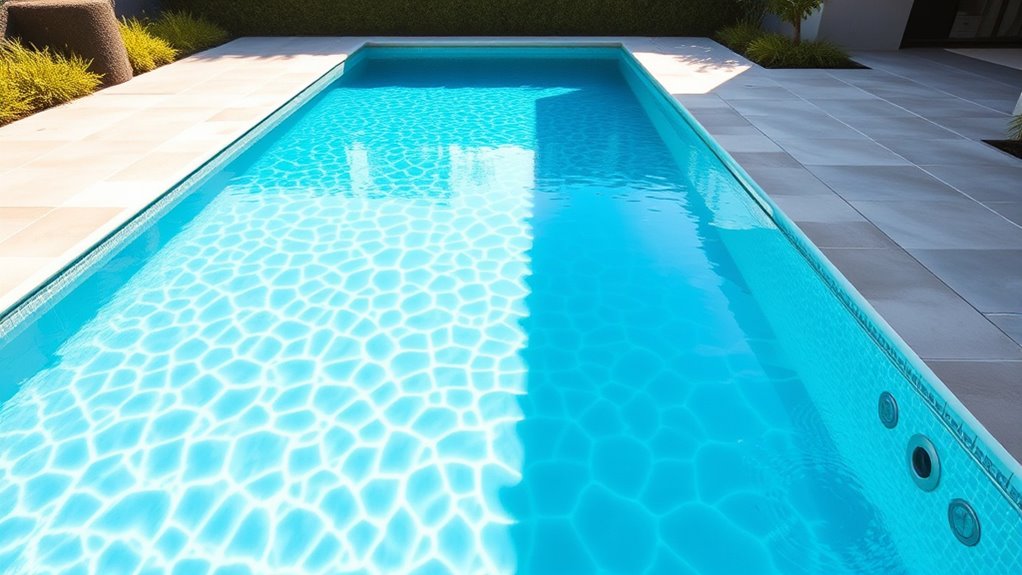
Choosing between saltwater and chlorine pools depends on how much time you’re willing to spend on maintenance and upkeep. Consider how each option impacts your skin and eye comfort during regular use. Also, weigh the costs and installation requirements to find the best fit for your lifestyle and budget. For instance, saltwater pools often provide a more comfortable swimming experience with gentler water, which can be especially beneficial for sensitive skin.
Maintenance and Upkeep
When it comes to maintaining your pool, understanding the ongoing upkeep requirements is essential for making the right choice for your lifestyle. Saltwater pools typically require less frequent chemical adjustments since the salt generator continuously produces chlorine. However, you’ll need to monitor and clean the salt cell regularly to prevent buildup. Chlorine pools demand more hands-on attention, as you’ll need to manually test and adjust chemical levels often to keep water balanced. Both systems need filtration system maintenance, but saltwater pools may have longer intervals between certain tasks. Ultimately, your choice depends on how much effort you’re willing to invest weekly. If you prefer a more automated process, saltwater might suit you better. If you’re comfortable with routine testing and adjustments, chlorine pools could work just fine. For optimal water quality and to reduce maintenance efforts, investing in a whole-house filtration system can help keep your pool water cleaner and clearer.
Skin and Eye Comfort
Since skin and eye comfort can vary depending on your pool’s chemical levels, understanding how saltwater and chlorine systems affect these aspects is essential. Saltwater pools tend to be gentler, causing less irritation and discomfort. Chlorine pools, especially if not properly maintained, can cause dryness and redness around the eyes and skin. To compare:
- Saltwater pools usually result in softer skin and fewer eye stings.
- Chlorine pools may cause more dryness and irritation if chlorine levels are high.
- Proper pH balance is critical for both systems to minimize discomfort.
- Regular testing and maintenance help guarantee a comfortable experience for you and your family.
- Advances in pool water treatment technologies continue to improve the comfort and safety of both systems, making it easier to select the best option for your needs.
Cost and Installation
Cost and installation requirements can substantially influence which pool system fits your lifestyle and budget. Saltwater systems typically have higher upfront costs due to the need for a salt chlorinator and specialized equipment. Installation may also be more complex, requiring plumbing adjustments and electrical work. On the other hand, chlorine pools often have lower initial costs and simpler setups, especially with portable chlorination options. However, ongoing chemical expenses can add up over time. If you’re looking for a quick, budget-friendly install and lower initial investment, chlorine might suit you better. But if you prefer a more automated, low-maintenance system and are willing to invest upfront, saltwater could be more cost-effective long-term. Consider your budget, DIY comfort, and long-term expenses before making your choice. Additionally, understanding sauna ventilation can help optimize your pool and relaxation area for safety and comfort.
Frequently Asked Questions
Are Saltwater Pools Safer for Children and Pets?
Yes, saltwater pools are generally safer for children and pets because they have lower chlorine levels and produce gentler, less irritating sanitizer. You’ll find that saltwater pools cause less skin and eye irritation, making them more comfortable. However, you still need to supervise kids and pets around any pool, guarantee proper maintenance, and teach safety rules. Saltwater pools are a good option, but safety precautions remain essential.
How Quickly Can I Switch From Chlorine to Saltwater?
You can typically switch from chlorine to saltwater in about one to two days, but it depends on your pool size and current chemical levels. First, you’ll need to shut off your chlorine system, then drain or dilute the existing chlorine. Next, add the appropriate amount of salt, usually around 3,000 ppm, and turn on your saltwater chlorinator. Test the water frequently to guarantee proper salt levels and chemical balance before swimming.
Do Saltwater Pools Require Professional Installation?
Think of installing a saltwater pool as planting a delicate garden—sure, it’s doable yourself, but a professional’s touch guarantees it blooms right. Saltwater systems involve precise wiring, plumbing, and proper salt levels, so skimping on expertise might lead to leaks or uneven salinity. Hiring a pro guarantees your pool’s heart beats smoothly, giving you peace of mind and a sparkling, trouble-free oasis to enjoy.
What Are the Long-Term Durability Differences of Pool Equipment?
You’ll find that saltwater pools often have less wear on equipment because salt is gentler than chlorine, reducing corrosion over time. Chlorine pools may cause faster deterioration of pumps, filters, and heaters due to chemical stress. With proper maintenance, both can last long, but saltwater systems generally offer better durability and lower long-term repair costs. Regular upkeep and using quality equipment also help extend your pool’s lifespan.
Can I Use Natural or Alternative Sanitizers With These Systems?
You can definitely explore natural or alternative sanitizers for your pool, turning your oasis into a chemical-free paradise. Think of options like mineral systems, ozonation, or UV filters as your pool’s guardians, working silently to keep it clean and inviting. These methods reduce harsh chemicals, extend equipment lifespan, and create a gentle, soothing swim experience. Just make certain compatibility with your system and follow manufacturer guidelines for a safe, crystal-clear swim every time.
Conclusion
Ultimately, choosing between saltwater and chlorine depends on your lifestyle and preferences. For instance, a homeowner who values low maintenance might prefer saltwater for its gentler feel and fewer chemical worries. Imagine enjoying a invigorating swim without harsh smells or itchy skin—saltwater makes that possible. Consider your budget, environmental values, and comfort needs to make the best choice. Whichever system you pick, ensuring it suits your daily routine will keep your Endless Pool enjoyable for years to come.
